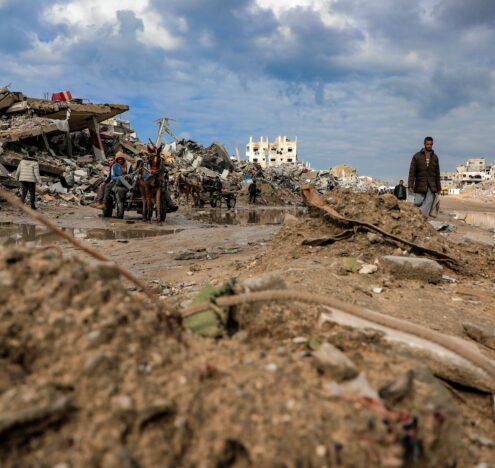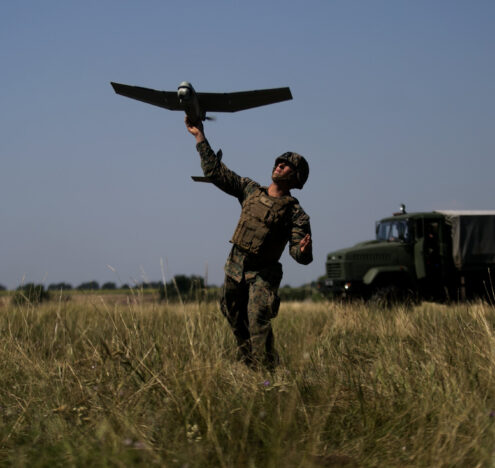“Adults in a Room” is a series in collaboration with The Stimson Center’s Reimagining US Grand Strategy program. The series stems from the group’s monthly networking events that call on analysts to gather virtually and hash out a salient topic. It aims to give you a peek into their Zoom room and a deep understanding of the issue at hand in less than the time it takes to sip your morning coffee without the jargon, acronyms, and stuffiness that often come with expertise.
For all the debate over US wars, there is little consensus about what constitutes success and failure, let alone how to assess whether Washington should go to war.
June’s Reimagining US Grand Strategy roundtable brought members of the foreign policy community together to discuss “Is War Worth It?”, a new project initiated at Stimson that seeks to provide data and analysis to policymakers on what constitutes success and failure in war. Two guest speakers opened by providing an overview of the project and its preliminary findings. A group of foreign policy experts then discussed the importance of assessing success and failure in war and how to best define victory.
Michael Cohen, Senior Fellow, Center for Strategic Studies, Tufts University Fletcher School, Co-director, “Is War Worth It?”
“Was it worth it?”
It’s a question that has been asked after practically every American war — a plaintive demand to understand whether the sacrifice in American blood was worth the ultimate benefits to US national security, American prestige, and the country’s place in the world.
There is a question, however, that needs to be asked — and rarely is — before American soldiers are sent into harm’s way. Is war worth it?
Too often, the decision to use military force is based on an untested set of assumptions, preconceived ideas of costs and benefits, and a political calculation of the long-term impact of going to war. Emotion rather than empiricism often drives decision-making.
The true, long-term costs of war — or its ultimate “worth” to the country — are rarely assessed and remain frustratingly opaque. How can a nation go to war without fully understanding or appreciating the potential long-term costs and benefits?
To help us tackle this question, we turned to the experts: security scholars, former policymakers, and former military officials who have made a career out of studying, understanding, and explaining war. We created a survey that asked a series of basic questions: “Which US wars were successes and which were failures?” What about wars fought by other countries? What are the metrics for assessing success and failure?
The responses were unexpected, not because they suggested broad agreement among a community of experts, but rather a striking lack of consensus.
When it came to the question of what wars are coded as successes, the top vote-getters largely adhered to conventional wisdom. The top vote-getters were (in descending order): World War II, the Gulf War, the Korean War, World War I, Panama, Kosovo, Grenada, Bosnia, and the fight against the Islamic State (or ISIS).
When it came to failure, the results were what one might expect.
The top vote-getters for failed US interventions were: Vietnam, Iraq, Afghanistan, Libya, Somalia, the Bay of Pigs, and the Korean War.
Still, some results were confounding. While the US entry into World War I contributed to the end of the conflict in Europe, it is difficult to argue that the war was a long-term success for the United States. In approximately one year of fighting, the death toll was the third highest outside World War II and the Civil War. Moreover, US involvement led to a domestic backlash and a sustained period of isolationism. The war failed to bring stability to Europe, and the victor’s peace signed at Versailles arguably contributed to the even worse global conflict that began 20 years later.
Perhaps the most unexpected result was the 2011 US involvement in the Libyan civil war. The US predicated entry into the conflict on stopping a humanitarian catastrophe after Libya’s leader, Muammar Gaddafi, threatened to massacre those rebelling against his regime’s dictatorial rule. That goal was achieved at a relatively minimal cost in blood and treasure, even as US goals evolved from a humanitarian mission to regime change and the deposing of Gaddafi as Libya’s ruler (a goal that was also achieved). Moreover, while Libya is hardly an oasis of stability today, respondents who judged the Gulf War, Korea, and Kosovo a success were seemingly less concerned that the conclusions of these wars led to uncertain outcomes, and, in the case of the Gulf War, future military conflict.
Among foreign wars, there were other unexpected results. The top vote-getter was Israel’s victory in the1967 Middle East war, with 31 out of 70 respondents coding it as a success, though several scholars noted that the Israeli occupation has created a host of challenges that lend doubt as to whether this war belongs in the success category. The third-largest vote recipient, Israel’s “victory” in the 1973 Middle East war, or what Israel calls the Yom Kippur War, was the most surprising. In Israel, that conflict is considered an intelligence and political failure. In Egypt, where it’s known as the October War is a source of national pride, and arguably, there are few better examples of the effective correlation of political and military goals. Egypt’s initial military success, though quickly reversed by Israel, paved the way for political negotiations that led to the return of the Sinai Peninsula and a newfound alliance with the United States.
Of particular note, there were the 27 votes for the United Kingdom’s victory in the Falklands War. Only one person coded Argentina’s decision to go to war a failure. Conversely, while the Gulf War is seen as the second most successful US war, only four respondents coded Iraq’s decision to invade Iraq as a failure. This result perhaps solidifies the aphorism that victory in war has a thousand fathers and defeat is an orphan.
However, of greater interest is the striking lack of consensus among respondents about what defines a successful or failed war.
One-third of the scholars took a narrow view of success and failure, focusing on whether a country’s military and/or political objectives were achieved.
Others took a more Clausewitzian approach and addressed the achievement of political objectives.
Approximately half of those who responded took into account the costs of war and the second and third-order effects of initiating conflict.
Another 11 factored in the costs of victory and second and third-order effects of the decision to go to war. Twelve respondents judged success mainly on the grounds of post-conflict stability. Other respondents considered a hodgepodge of factors — from the number of casualties and length of troop deployments to the strength and viability of post-conflict regimes and security arrangements.
But what stood out for us was that so many scholars didn’t take into account whether the costs of military conflict were commensurate with the benefits. A plurality of respondents simply focused on the question of whether objectives were achieved, with little room for what came after or whether the objectives truly furthered the national interest.
These disparate survey responses suggest further opportunity for research. After all, if even those who have spent their careers studying war cannot come to a consensus, how can policymakers, who best balance a host of other factors, come up with the right answer either?
Paul Fritz, Associate Professor of Political Science, Hofstra University
Many of the ways used to judge success and failure in war or other types of military engagement have the potential to obscure as much as illuminate. The most straightforward yet possibly least useful way to think about success or failure is to focus on battlefield outcomes. While policymakers may find this politically useful, who won a particular engagement in terms of targets destroyed or forces neutered often tells us little about the purpose of using military force. War is the continuation of politics through other means, as Clausewitz told us, so we must consider not just battlefield outcomes but also whether the political aims associated with the use of force were achieved.
As important as centering political-military objectives is for determining success and failure in war, this still has limitations. The US arguably achieved its political-military objectives in the Iraq War by removing Saddam Hussein and imposing a (mostly) democratic system in the defeated state. But few probably consider this war successful. The material and human costs were — and continue to be — staggering. While high costs can sometimes be worth the effort if significant strategic gains are made, this did not follow the massive US effort in Iraq. The vacuum created by the destruction and slow rebuilding of the Iraqi state allowed Iran to expand its influence in the region. Moreover, imposing a new regime comes with the hope of gaining a reliable partner in an erstwhile enemy, something that is questionable when it comes to the US-Iraqi relationship today.
The material and human costs were — and continue to be — staggering.
This suggests it is imperative to consider multiple domains when thinking about the success and failure of military engagements. Political-military objectives should clearly be one domain, as should basic cost-benefit analysis as it relates to those objectives. But the success and failure of military engagements — whether rising to the level of war or something less than war — should also be thought about in terms of post-conflict stability. After all, states often fight wars or engage in military strikes with the hope of avoiding a potentially more costly future conflict. If a war or military strike achieves its stated political-military objectives but destabilizes the region or plants the seeds for future conflict, it’s hard to judge the initial action successful.
None of these metrics by themselves are complete indicators of success or failure in war. The ones mentioned above, along with potentially many others, should be examined independently with the understanding that different metrics will likely give different answers to the question of success or failure. Done prospectively, this can hopefully lead to wiser decisions by giving decision-makers a fuller picture of the trade-offs associated with the use of military force and the ability to weigh different domains as they relate to political goals.
The recent American strikes on Iran’s nuclear facilities make this all very clear. The military operation seems to have been successful in terms of hitting the intended targets and likely setting back Iran’s nuclear program. But the current debate about the strikes — whether the Iranian nuclear facilities were “obliterated” as President Donald Trump says or set back only a matter of months as initial intelligence estimates suggest — focuses too much on the extent of the battlefield success. While this matters in terms of Iran’s nuclear breakout time and thus has policy implications going forward, it’s a limited view and may not tell us much about the wisdom of the action.
Looking at post-conflict stability, the US strikes may be successful if, for example, they set the stage for a cooling of regional tensions, resumed nuclear negotiations, or perhaps unambiguous Iranian compliance with existing Nonproliferation Treaty obligations. But these outcomes seem unlikely given the challenging post-strike diplomatic situation and Iran’s move to suspend cooperation with the International Atomic Energy Agency. If Iran moves to double-down on its nuclear program in the absence of international monitoring and safeguards, it will certainly have destabilizing effects regionally and likely renew conflict-inducing dynamics. While post-conflict stability is just one of the domains of success and failure we should consider, it could prove to be one of the most significant in this case.
Joshua Rovner, Associate Professor, American University; Senior Nonresident Fellow, Brookings Institution; Author, Strategy and Grand Strategy.
French and American forces defeated the British at Yorktown in 1781, effectively securing victory in the American War of Independence. Celebrations erupted throughout France and among the victorious soldiers in America, who rejoiced at their astonishing triumph. The mood was much different in London, where politicians and military officers furiously tried to shift the blame for their ignominious defeat.
French strategy — its theory of victory — was exceptional. Military leaders crafted an effective combined arms approach and worked well with their American counterparts. French diplomats simultaneously built a durable wartime coalition that isolated the British. The outcome was a clear and decisive victory.
British strategy was a disaster, a mess of misunderstanding, operational blunders, and civil-military dysfunction. Both the army and navy failed. For all of their formidable fighting power, the redcoats began the war without really comprehending the scope and depth of the rebellion. And despite their well-earned reputation for naval mastery, Royal Naval commanders were timid and indecisive at key moments. Mixed messages from the government compounded these problems.
From the perspective of strategy, the war was a glorious success for France and a humiliating failure for Great Britain. From the perspective of grand strategy, however, the outcome was reversed.
French grand strategy — its theory of security — was plagued by contradictions. The theory was based on three irreconcilable pillars: disciplining French finances, maintaining the balance of power on the continent, and reducing British power. These goals worked at cross purposes. Efforts to modernize the tax system and bring down the debt, for instance, were fundamentally at odds with the costs of competing with Great Britain. The costs were bound to rise in the case of war, and some French officials warned against intervention for precisely that reason.
Helping the Americans was extraordinarily costly to France, plunging the country into a deep fiscal hole at a time when it lacked the financial tools to accommodate its debt burden. The dramatic victory obscured the problem — but only temporarily. The war aggravated the growing economic and social calamities that ultimately led to political breakdown. Strategic success led to grand strategic failure.
Meanwhile, British grand strategy was in flux. Although it had gained a huge amount of territory in the 18th century, it was just beginning the process of rationalizing the Royal Navy bureaucracy, part of a broader administrative revolution that would provide the foundations of its 19th century empire. The war put everything on hold. The desperate effort to hold onto a huge chunk of North America was a distraction from the effort to fortify the real sources of British security: trade, finance, and the Royal Navy.
Although the war was a strategic calamity, it was ultimately a blessing for grand strategy. The shock of losing forced a hard conversation in London about the nature of its empire. British leaders reinvested in their navy, returned to the project of naval infrastructure, and moved away from mercantilism. What followed was a grand strategic milestone — the birth of Pax Britannica.
This year, as we mark the 250th anniversary of Lexington and Concord, it is worth reflecting on the French and British experiences in the American War of Independence. Paradoxically, the French suffered for their success, and the British emerged much stronger for their strategic debacle. France descended into horrendous depravity and violence, while Britain became the dominant great power in international politics. History was written by the losers.
So, is war worth it? The answer depends on the quality of strategy and the logic of grand strategy. But it also crucially depends on the ability to avoid mistaking one for the other. The current US fixation on “lethality” is unsettling in this context. US leaders who focus on killing power are at risk of conflating combat effectiveness with durable political results, confusing strategy with grand strategy, and falling into the same trap that befell the French.
Christopher Preble, Senior Fellow and Director, Reimagining US Grand Strategy Program, and Nevada Lee, Research Associate, Reimagining US Grand Strategy Program
Advocates for war typically argue that the benefits will far outweigh the costs. The benefits are often hard to quantify, but the obvious costs include dollars spent and opportunity costs (things forgone). Some also consider the political costs that a wartime leader might suffer if the conflict goes badly or claim that the war will deliver political benefit if it goes well.
But these assessments don’t tell the entire story. When the United States goes to war, or employs military action short of war, there are reputational costs as well. Simply put, US global standing suffers if the war is seen as unjust or violates global norms against the use of force. Obviously, this is a much more difficult statistic to capture than the cost of ordnance dropped or fuel used during an airstrike, for example, which partly explains why reputational costs are overlooked. However, a full accounting of whether a war is “worth it” must attempt to capture all costs, not just those that are easily quantified.
Two risks war poses to the United States’ reputation are particularly salient.
First, all war involves killing. If that killing is seen as inappropriate or excessive, the US’s reputation suffers. In accordance with long-standing traditions and international law, the United States officially commits to minimize harms to non-combatants. But some unintentional deaths are unavoidable. In the post 9/11 wars, some have estimated that over 400,000 civilians were killed to only around 290,000 combatants. Even without exact figures on civilian deaths, however, trying to rebuild a society that believes the United States is indifferent to civilian suffering is a struggle against steep odds.
If that killing is seen as inappropriate or excessive, the US’s reputation suffers.
In other words, US wartime errors hurt America’s reputation in ways that make it hard for Washington to achieve its objectives. And this applies globally, not just on-the-ground, or in the country directly affected. In 2015, for example, when a US military aircraft struck a Doctors without Borders (Médecins Sans Frontières) hospital in Kunduz, Afghanistan, it, rightfully, sparked international outrage. The UN denounced the strike, Switzerland paid for the investigative commission to look into the strike, and the incident sparked debate across the EU.
The second intangible is how the use of force has come to define US global identity. The United States is seen as a nation with a propensity to rely on its military as a first resort. Conducting limited strikes, supporting coups, or sending weapons to try and shift another country’s foreign policies all contribute to the US reputation for using the stick before the carrot. This further undermines other US approaches — be they diplomatic, economic, or social solutions — to global problems. The image of a US soldier handing out candy to children in a foreign country might be superficially pleasing, but it should not be the only thing non-Americans think of when they think of America. If one’s sole experience interacting with Americans is seeing one in tactical gear, US claims of being a peaceful nation become difficult to believe.
These reputational costs are particularly relevant given the Trump administration’s proclivity for air strikes and its emphasis on bolstering the military’s “lethality” (whatever that really means). To a certain extent, recent US actions are unsurprising; they are consistent with a pattern that goes back at least to 9/11. But the continued resort to force as the standard US approach to the outside world ultimately reinforces America’s reputation as a nation committed to war. This reputation inevitably makes it harder for US leaders to achieve peaceful solutions to geopolitical crises, no matter how much they tweet about “peace through strength” being the ultimate goal.
Chijioke Onuchukwu, MPA Candidate, O’Neill School of Public and Environmental Affairs at Indiana University; Foreign Policy Futures Participant, Stimson Center
Growing up in Nigeria under a military dictatorship, with a father who exposed me to global affairs and political issues both at home and abroad, I developed a particular view of US military interventions. For Americans, the cost or benefit of a war is often measured by casualties, resource expenditure, and the accomplishment of stated objectives. For those outside the US, the benefit of a war is viewed through the postwar situations that citizens find themselves in at the end of the conflict.
I grew up seeing the US as the world’s police force; a country committed to ensuring that democratic ideals and principles of freedom spread globally. The success of the 1991 Gulf War deepened this view, as the US-led effort succeeded in enforcing national sovereignty and protecting smaller nations from regional bullies. The swift, decisive victory with clear objectives validated American military effectiveness and moral authority.
The 2003 Iraq War began to shift this perception. The war was launched on the faulty premise of weapons of mass destruction, and what started as a swift military victory turned into a prolonged occupation that led to chaos and political instability. With Saddam Hussein gone, Iraq did not transition to a stable democracy but instead fragmented and quickly became engulfed in civil war.
The pattern became clearer in 2011 during the Arab Spring. The US-led NATO alliance intervened in Libya under the Responsibility to Protect doctrine, ending Gaddafi’s 42-year rule. The stated reason was protecting civilians, but the actions revealed a desire for regime change.
The US-led intervention was initially touted as a success; Gaddafi was overthrown without any coalition combat deaths. However, Libya quickly descended into chaos and prolonged civil war. Instability became the norm, with different factions controlling different regions in the absence of a central government. Libya became a center for human trafficking, with smugglers turning humans into commodities. The country’s collapse had severe regional consequences: weapons proliferation, the spread of Islamist extremists, and increased migration pressures across the Sahel. Libya effectively became — and remains — a failed state.
This raises a question about how to evaluate US wars. For those outside the US — especially those on the receiving end of US military power — none of the metrics matter as much as what happens after the war ends. No matter what the stated objectives of US involvement may be, if intervention leaves a country and its citizens in a worse state than before, the US has failed to accomplish its goals. If the objective was regime change or enforcing democracy, but the intervention brought instability, insurgency, and chaos, then it failed. Interventions that leave citizens in ruins and uncertainty, despite achieving democratic principles or overthrowing a tyrant, represent complete failure.
This is not an argument for or against the US engagement in conflicts or humanitarian intervention. Rather, it is a call for a broader understanding of postwar effects on citizens and countries when evaluating the costs and benefits of military action. Interventions may sometimes be necessary, but they must be undertaken with clear plans and understanding of their potential effects on target populations and regional stability. Too often, these key questions are secondary concerns in Washington.
From an outsider’s perspective, the lives of people who bear the consequences of war should be the primary measure of its success or failure. War primarily affects humans, and its repercussions shape the future of everyone involved. The true measurement of the benefits of war must include evaluating the lives of those affected by the intervention.




















